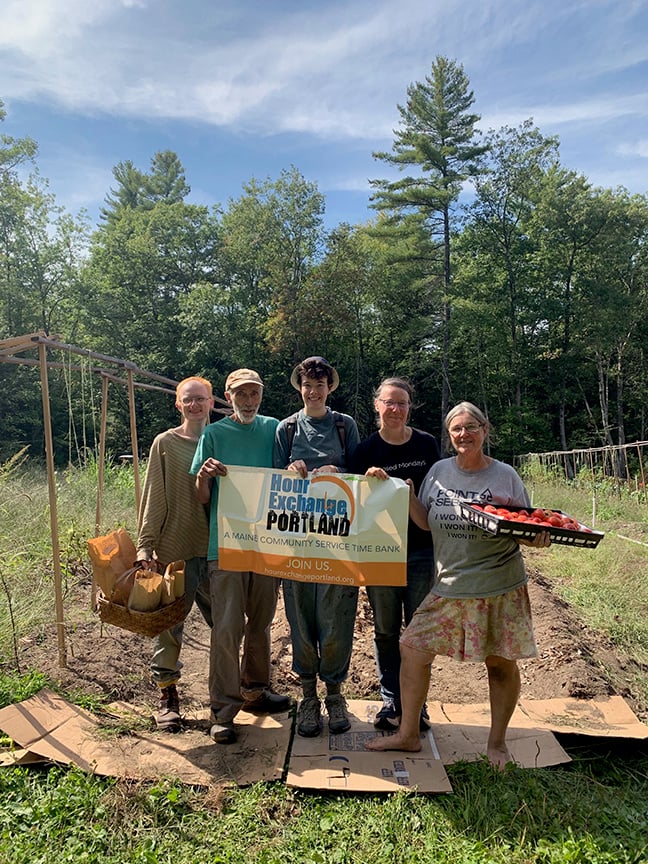By Ella Fassler
Copyright truthout

In Kent, Ohio, older white women and immigrant families are forging unexpected connections through a time exchange network. Through time exchanges — sometimes called time banking — members earn time credits by helping others, then redeem them when they need assistance themselves. It’s not barter, or charity; time banking emphasizes reciprocal exchange, recognizing that everyone has something to offer, and that we all need help sometimes.
“The time bank usually has a need for healthy young men,” laughed Dawn Albright, president of the Kent Community Time Bank’s board of directors. “I would say, 70 percent of the members are older women.” Younger immigrant members of the time bank often offer assistance with household tasks, like carrying heavy things up the stairs. She recalled a story of members rallying to help a woman in her 50s who had to leave her home on short notice. They moved boxes, painted walls and stripped floors to make her fixer-upper livable. In return, Albright said, immigrants often request help with navigating challenging systems, like health care appointments.
Albright also said her own social life is deeply intertwined with the bank. “It really feels to me like almost everybody I know is in the time bank,” she said. “If I run into a random person or a neighbor, they’re in the time bank.” Members meet and greet through monthly potlucks and craft nights organized by the time bank leadership.
With over 530 active members and more than 101,000 hours exchanged over the past 15 years, Kent’s time bank is one of the most vibrant in the world. Last year alone, members completed 3,900 exchanges through the original version of Time and Talents, a free platform provided by the time bank support cooperative hOurworld. About two years ago, hOurworld introduced a second version of the platform. The second version’s interface is user-friendly and simple: Requests are posted on one side, and offers on the other. Users can track their time credit balance, and exchange private messages with each other about their needs and skills. Membership isn’t limited to individuals — art galleries, businesses, and even governmental groups have requested volunteer labor in exchange for time credits through Kent’s time bank.
Kent’s time bank is one of more than 200 that use either version of Time and Talents, according to hOurworld co-founder Stephen Beckett. He co-founded hOurworld in 2006 in Maine after realizing there weren’t any viable time banking software platforms that really met local organizations’ needs. During this period, time banking gained traction with financial backing from Richard Rockefeller, whose interest in time banking was piqued after he heard a 1995 lecture from time banking pioneer Edgar Cahn. In his lectures, Cahn emphasized the deep interconnection between caring for one another and caring for the environment. Many of the time banks in Maine have since folded, but Hour Exchange Portland — of which Beckett is a member — endures, with over 1,500 members and more than 1,600 exchanges recorded last year.
For Beckett, time banking is less about economics, and more about mending social fragmentation. “We invariably wind up making friends,” he told Truthout, noting that he offers sailboat rides to fellow members. “The whole point is to knit community.” Some banks seem to wither not because they fail, but because they succeed. People stop recording hours once they are friends. “Your time bank’s a complete success now,” he said. “You built community.”
Toward a Solidarity Economy
Though time banking in its digital form is relatively new, leftists and anarchists have been experimenting with time-based economies for centuries. In 1827, anarchist Josiah Warren opened a successful “Time Store” in Cincinnati that accepted labor-time vouchers, and several other local stores soon began accepting vouchers alongside U.S. currency. Several years later, Warren left the store to a friend while he traveled through the Midwest to establish more stores that accepted time-based credit. The first contemporary time bank was formed in Japan in 1973 to compensate housewives for their labor.
Madison-based organizer Stephanie Rearick fits within this politicized legacy. She helped start a time bank in 2005, after she learned about it as one economic system of many in a book called The Future of Money. “I realized that time banking should address the things in our economy that most need to be addressed,” Rearick said, “such as the degradation and devaluation of care and creativity, civic engagement and community work.”
At first, people didn’t feel comfortable asking for help in the time bank, recalled Rearick. That changed when organizations who support people with disabilities joined. Members started posting complimentary needs and offers, and the exchanges took off.
“People with physical and cognitive disabilities, as well as people with mental health diagnoses, really enjoy participating,” she said. “It gave them a chance to be recognized for their strengths instead of whatever their diagnosis is, and to interact with a much larger social circle. Often people with disabilities only interact with staff and do the activities staff have time for. This opened up new worlds for people.” She noted that time banking research shows transportation, care, and companionship are among the most common exchanges.
In the early 2010s, on a shoestring budget, the time bank launched a cooperative aimed at addressing local needs, starting with access to clean energy. Members earned hours by canvassing neighbors to join the cooperative, conducting energy audits, and weatherizing homes.There were plans to train members to assemble solar panels, and to generate revenue to fuel a common fund — enough, they hoped, to purchase a shared van.
“It was all dreamed up by the neighbors,” Rearick said. “A beautiful example of how time banking could lift up the value within a community.”
She paused, then added, “Yeah, anyhow… that process got diverted and aborted.”
After the only grocery store in the neighborhood shut down, the organization redirected its efforts toward building a food cooperative. At first, neighbors were enthusiastic about contributing and earning time credits for their efforts. But when government grants introduced the option to earn money instead of time credits for canvassing, the dynamic shifted. Those grants dried up, so did the momentum, and the co-op never got off the ground.
“When people stop earning money, they feel like it’s a demotion or something,” Rearick said. “It’s an example of how the capitalist economy is designed to eat the commons and eat the community. I’ve been seeking the antidote to that. How you interact with that economy without letting it eat what you’re doing.”
At its peak, the organization had an operating budget of $500,000, partially funded by government contracts. That money paid for five staff positions, rent, insurance, events, and other programs. They ran four restorative justice programs with local schools, transportation hubs for people with disabilities, and a range of wellness initiatives.
But that type of funding came with a cost. “It just naturally creates mission drift,” she said. “And that’s my total experience. I think time banking needs to become independent from that system and part of a system that is designed to nourish it instead.”
Rearick sees common funds as one antidote to co-optation and collapse. Through them, neighbors pool money collectively to support shared projects and one another. After leaving the time exchange in 2017, she helped launch a common fund in 2022 as president of Humans United in Mutual Aid Networks (HUMANS), a global cooperative network focused on building a mutual aid economy. Time exchanges and common funds, she said, are just two tools of many that can be used for cultivating what she calls a neighborly economy.
Keeping time banks decentralized is also crucial for shielding them from the nonprofit industrial complex. “I think the more people have ownership, the more people are developing it, and the more skills they build within it, the better,” Rearick said. Still, she acknowledged that since the pandemic, HUMANS has relied too heavily on her. “Before that, we had teams doing everything — work groups, shared leadership.”
Rather than defaulting as a nonprofit with a formal board, groups might experiment with open organizing models where anyone can participate. While many modern time banks operate in relatively apolitical spaces, revolutionary mutual aid groups could reclaim them as tools for building power. Through them, they may find a way out of siloed organizing, and toward a democratic, care-centered economy that benefits all of us.



